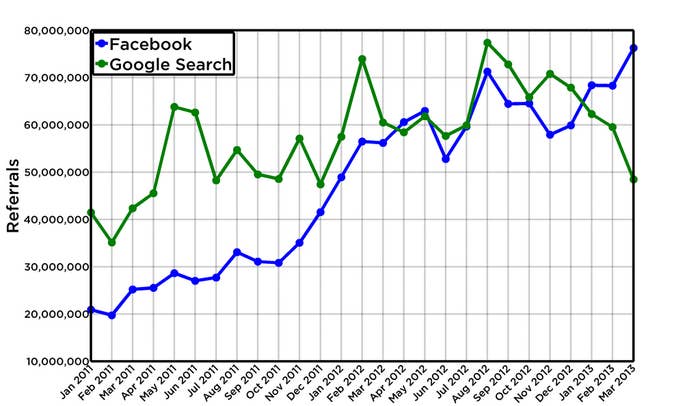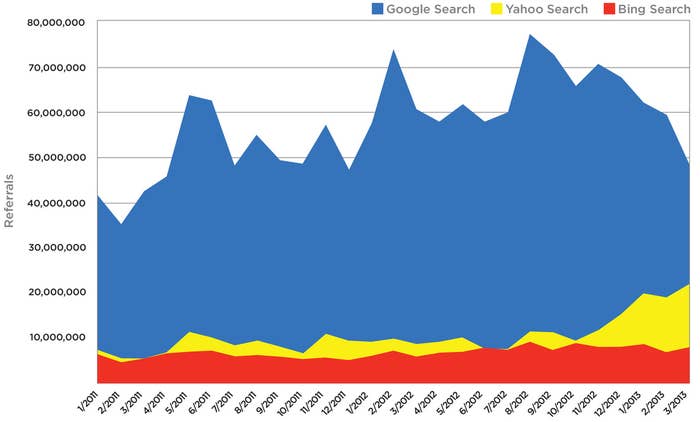
Search traffic to publishers has taken a dive in the last eight months, with traffic from Google dropping more than 30% from August 2012 through March 2013, according to research done by BuzzFeed. While Google makes up the bulk of search traffic to publishers, traffic from all search engines has dropped by 20% in the same period.
BuzzFeed tracked traffic referrals to over 200 publishers in the BuzzFeed Network, a group of sites that carry BuzzFeed's tracking code and include the Huffington Post, Daily Mail, NewsweekDailyBeast, Time, Sports Illustrated, Us Weekly, and Rolling Stone. Collectively the sites represent an audience of more than 300 million people globally.

Of the three major search engines — Google, Yahoo and Bing — only Yahoo saw growth in this period. While Yahoo grew search traffic in this period, it sent 21M referrals to publishers in March, less than half of the 48M referrals sent by Google. Traffic from Bing dropped 12%.
In the past, we've reported how referrals from social platforms like Facebook to the BuzzFeed Network were growing, and at times sending more traffic than search. While that difference was at times marginal — 5 to 10M referrals — its now sustained and significant. In March, Facebook sent 1.5x more traffic than Google, the greatest difference we've ever measured between the platforms. At the same time, we've watched traffic from other social platforms — Twitter and Pinterest -—continue to grow an audience and drive traffic traffic to publishers. "Dark social," that netherland of direct traffic, is also accelerating on the network, growing referral traffic to publishers by 52% over the past twelve months. By comparison, referrals from social platforms, i.e. the Facebooks, Twitters, Pinterests and Reddits of the world, grew by 25%. It begs the question, could direct traffic be taking the place of search?
We can draw a lot of assumptions but few conclusions from the drop in search traffic. It's probably safe to say that user behavior is changing, and we are seeing a shift in the way readers discover their content. We aren't hunting for content as much as we are foraging from what's right in front of us. We know that most of direct/dark social traffic is from mobile and apps. Could it be that social apps that aggregate content like Pulse or Flipboard are growing in importance?
The answer may also lie as much with a change in publisher behavior than in user behavior. Are publishers investing less time in SEO than they used to and putting those resources into social? When SEO was king, publishers sought to program their content to be discovered by Google. Now that content requires human muscle to be shared on social platforms, publishers need to expend a different kind of energy focused on creating content that's emotional, funny and discoverable — i.e. the stuff you might want to share. And this may be what's killing search traffic too.
Whatever is causing the drop in search traffic, the trend doesn't appear to be a transient one. Google is still the overall king of the internet, but in this part of the digital world its reign is over.
